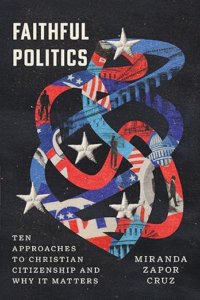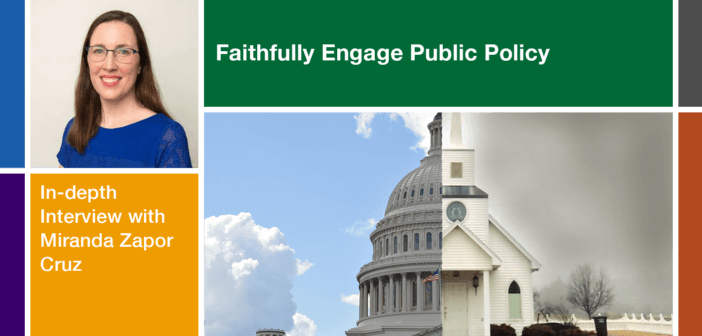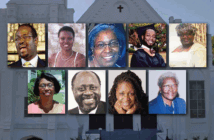How can Christians faithfully engage public policy? Jessica Anschutz interviews Miranda Zapor Cruz, professor of historical theology at Indiana Wesleyan University and author of Faithful Politics, 10 Approaches to Christian Citizenship and Why It Matters, about how Christians can engage public policy in faithful, yet nonpartisan ways.
Watch the interview video, listen to the interview, or continue reading.
Jessica Anschutz: Our focus is how Christians can faithfully engage public policy. Miranda, I invite you to share about the context for your book and how you came to write it.
Miranda Cruz: So, my academic interest in the intersection of faith and politics goes back to undergrad and studying theology and church history, but really developed as I became interested in the church under communism, and studying what it meant to be faithful in Eastern Europe. Which led me to the bigger question of, “What does it mean to follow Christ faithfully in any context, especially any political context?”
For the last several election cycles, I have been a professor at Indiana Wesleyan, primarily teaching undergraduate students who are planning to go into ministry. These students are earnestly wrestling with this question of, “What does it mean to faithfully follow Christ in this very politically fraught context that has characterized their entire adolescence and their early adulthood?”
The questions that they’ve been asking me for the last 10 years, “What’s the relationship between the church and the state?” “What does it mean to follow Christ while being an American?” “What does it look like to be politically involved or not?” All those questions are the things that really fueled my desire to write this book, and those are the specific students, and the specific questions, that I had in mind as I was writing.
Jessica Anschutz: It’s wonderful how your work has come out of your experience with your students in the classroom. What do you hope our audience of church leaders will glean from your work?
Miranda Cruz: I really want church leaders to get some useful tools that they can bring into their own leadership in their congregations that would help them to think through political engagement with more nuance, and to help their congregations think through their own political engagement. To go beyond the common Christian modes that I see of either completely separating faith and politics so that faith is just private and has no role in public at all, or becoming so overwhelmed by politics that you back off and don’t want to be engaged or informed about what’s going on. Or the opposite extreme of bringing faith and politics together in a way that becomes nationalistic. I think those are the three I see most commonly. My book tries to provide people with a framework for complicating that political engagement in a way that is hopefully helpful and can aid our civil discourse. I also hope it will help Christians respect people who share the same beliefs, but still come to different political conclusions.
Jessica Anschutz: I appreciate your approach given the polarization that we are experiencing in this country. What does it look like for church leaders to follow Christ as they engage public policy?
Miranda Cruz: Church leaders need to be very clear about the faith motive for any policy position or political advocacy. There’s a place for public advocacy for the common good that’s part of our role as clergy. If we’re so isolated from what’s going on in the world, are we really loving our neighbor? Are we really ministering to the communities where God’s placed us? The language and the rhetoric we employ when advocating for what we believe the Bible calls us to advocate for can cross over into politically partisan talking points. Sometimes we’ll take issues that are sacred to us as Christians and are part of our vision for human flourishing and for what God calls us to, and we make those issues very, very small so that they can fit into a simple policy position.
We need to understand that policy and advocacy can be part of the way that we help people see God’s vision for the world and our place in it. Our job isn’t done when we have advocated, attended a march, gotten a law passed, or whatever kind of policy bullet point that might be. When clergy are preaching or leading, there’s a difference between talking about that biblical narrative, those positions and values that God calls us to, versus saying, “This is the party, this is the person, this is the law that you have to support,” and thereby excluding those who might say, “I agree with you that God calls us to this, but I don’t actually agree that this is the way that should be implemented.”
Jessica Anschutz: In the book, you talk a lot about “Christian citizenship,” and your answer was alluding to that a little bit. I want to be sure that you define and explain “Christian citizenship” for our listeners.
Miranda Cruz: I argue that Christian citizenship must have a discernible “Christian-ness” to it. A Christian who is a citizen, in this case of the United States—the context I’m writing in— our citizenship shouldn’t be carried out or look the same as people who aren’t Christian or people who are part of other faith traditions. So, separate from policy positions or party alignments, our Christian citizenship needs to be “salty.” It needs bring salt and light. We’re adding something that’s missing. Our public discourse should be such that people miss the Christian voice if it’s not there, and I don’t think that’s generally the case right now.
It should be social. What I mean by that is it’s concerned about real social situations. It’s not a “Pie in the sky, by and by, someday when we all get to heaven, it’ll be fine, so we don’t need to do anything now.” So, it is focused on the real, social circumstances that people live in. It’s pluralist, meaning we recognize that we live in a pluralist society. It’s diverse. Different Christians will approach pluralism differently and think differently about other religions and interreligious dialogue and things like that, but we live in a country that is not entirely made up of Christian people. Even within Christianity, there is a wide range of positions and ways people approach Christianity. We can embrace that pluralism and say, “What is it that we uniquely are bringing to our context? And how is what we are inspiring people to want to know Christ, to hear and see the way that we engage in the public sphere,” and say, “There’s something different about the Christians and the way that they do this, and the way that I experienced love, even in the midst of these very fraught, tense conversations.”
Those are just a few things. Ultimately, we should look different. Our Christianity should form us and so deeply transform us that there is something different about the way that we are engaging our citizenship.
Jessica Anschutz: Say just a little bit more about how Christians can engage in non-partisan ways. You talk in the book about how often people’s politics when their faith aligns with a particular political party, but looking more deeply at faith, so that they’re engaging in a more faithful way. What might that look like?
Miranda Cruz: Christian leaders and pastors have a unique responsibility for representing Christ first, foremost, and only. That’s a different responsibility than Christian lay people necessarily have. And so, from a Christian leadership perspective, it’s important that our positions cannot be strongly aligned with a party or a particular candidate because we are uniquely called to be representatives of Christ and to lead out front in the mission of making disciples. If there’s any confusion about being a disciple of Jesus Christ, requiring alignment with a specific position, or voting for a particular person, then we’re leading people in the direction of idolatry, ultimately.
There are many social and political issues that clergy Christian leaders can, and should, care about. There’s a difference between forming people in their understanding of what it means to care for widows and orphans, or to value the sanctity of human life, or to care for immigrants and refugees. Those are all things that come directly from scripture. We can form people’s vision for what God calls us to without taking that next step and saying, “Therefore, you need to register to vote for this party,” or “Therefore, if you’re a Christian, you have to think this way about a specific law.” If we’re failing to talk about things that have political significance, we’re not preaching the whole council of scripture. We can lead people to understand what it is that God calls us to in the world, without aligning with a particular party or person.
Jessica Anschutz: There are some church leaders, pastors, and laity, who are already in the trenches doing this work. There are some that are still sitting on the sidelines, thinking about how to engage. For those who haven’t yet engaged in this public policy work, how might they seek to engage?
Miranda Cruz: It must start with becoming well informed. For a lot of people who aren’t engaged or who don’t have issues that they really care about and are advocating around, it can be simply that they don’t feel like they know enough to know what to do, and sometimes that can be paralyzing. We’re surrounded by information, disinformation, and misinformation. It can really be overwhelming to the point of saying, “I don’t want to say or do anything because I don’t think I understand, and I might be wrong about something,” (and we’re all afraid of being wrong). On the flip side, we can be overconfident and say, “I am so certain that I’m right about this that I’m not even willing to entertain the possibility that there could be another perspective.”
So, for pastors who say, “I think this is an important issue for me to be involved in my community,” it starts with finding good sources of information. Build relationships with your local elected officials. Start local with your city council or your mayor. The people involved depend on where you’re located and how big your town is. Your local government wants to talk to you. They want you to show up at city council meetings, (and if they don’t, then that’s another issue to be concerned about), and to start building those relationships that would allow you the opportunity to become a trusted voice in particular conversations. That looks different around different issues, in different locations, but that’s really the place to start. See, what is going on in my community that I care about as a Christian. What voice or perspective do I bring that doesn’t come across simply as, “Well I’m a Christian, and therefore I align with this party and this person,” but comes across as a Christian: “I love my neighbor as myself, and I believe that part of that love of neighbor is engaging with this particular issue or issues.”
Jessica Anschutz: Once folks are engaged from this “love of neighbor” perspective, and they have become informed, they’re doing the work, how might they seek to engage others in the work? How can those leaders get the people in the pews involved?
Miranda Cruz: One of the valuable ways of doing that would be through small groups or Sunday evening discussions. Different church cultures manage the details of that differently. In general, I don’t think preaching is necessarily the most helpful way to get people involved around particular issues because there is a high degree of people who think they heard what we said but didn’t hear what we said, and that can be misinterpreted. And so not to say you don’t ever address political issues from the pulpit, but getting people activated and engaged in a particular policy issue or something that’s going on locally maybe something you introduce on Sunday morning and say, “We’re going to have this opportunity to talk about that more.” People can kind of self-select into that then.
Christian leaders need to model the kind of dialogue that we hope our congregations are having. And so, that says a lot about the kind of tone that we bring. It says a lot for the way that we talk about the people we disagree with and the assumptions we make about people who are in the room. Congregations have become so self-sorted along political lines that we sometimes assume that everyone in the room agrees with us. So, we take it for granted, that, “Of course, we should take this action. Of course, we all support this policy. Of course, we all voted this way.” Sometimes that’s true, but often it’s not. Often, people have a slightly different take on something, or they’re more liberal or conservative than you anticipated. So, talking about an issue in a way that doesn’t assume that everybody there is on board, or has the same idea, or even [in a way]that doesn’t assume that the position I might take as a Christian leader is the only right Christian position. Again, that depends so much on what the specific issue is and what we feel called to advocate for.
Jessica Anschutz: I appreciate you highlighting the importance of sitting in that tension and seeking to understand the nuance, rather than sweeping it under the rug or avoiding the conversation because you anticipate conflict. How might leaders prepare or equip themselves to do this work of faithfully sitting in the tension?
Miranda Cruz: We must be prepared for the reality that not everyone wants to sit in that tension with us, and we need to be firm and settled in our commitment to that nuance and tension. We must be more committed to the nuance than we must be committed to a specific position. Committed to pushing congregants who may see things in a very black and white way and may read nuance as waffling or not taking a strong enough position on an issue. People leave churches over that kind of thing; people certainly email their pastors and call out their churches on social media, and they can get very ugly. That’s the reality, and anyone who’s been a pastor or in that kind of position is aware of that. We need to be prepared for that. We can’t delude ourselves into thinking, “If I just express it in the right way, my congregation is going to come along.”
I tend to be a very optimistic person who thinks if people just understood “this,” they would see how valuable this is, or they would understand a biblical position on this issue. Human nature isn’t that simple, so we must be prepared. Depending on your church structure, conversations with boards, elders, or church leaders about very practical things like: “Do you have people in your congregation, in your denominational hierarchy where that’s applicable, who have your back if people in your congregation have a serious problem? If you lose funding, if you lose financial support?” We don’t always like to talk about that financial cost, but it’s a real thing. We need to be aware of what that cost could be. It’s one thing to say, “I know that I’m doing the right thing, and so come what may.” But in some cases, people need to be emotionally, relationally, even financially prepared to potentially lose their jobs, or to have to take a pay cut, or to have other kinds of repercussions for their political stance. Because that cost can be so high, I think that makes it more important that we know the kind of cost is what comes of it. I’ve paid that cost because of faithfulness to Christ, not because I’m so committed to being a Democrat or a Republican, or because I’ve lined myself with a particular candidate or political leader.
Jessica Anschutz: In the book, you write about how kingdom citizens should be conflicted about our policy opinions and our partisan leanings. What does this look like if we are conflicted? Folks so often get stuck in their positions. How can we really live into those conflicted places and spaces?
Miranda Cruz: We start with the understanding that no political party is the “Christian political party.” We’re not bringing about the kingdom of God on earth by getting peoples or parties in power. The ways that we bring about justice, (that’s the hope of law, is that it’s making the world more just), those actions are always going to be incomplete. We will not experience complete justice until the eternal kingdom of God, and we don’t bring that about by getting the right policies passed.
In a fallen world in which there is brokenness and complication in every aspect of society, we’re conflicted because we recognize that, “In my support of this policy, (whatever that policy is), some people are going to be helped, and some people are going to be harmed.” I cannot think of an example where that’s not true. Now, we can think of examples where the harm that’s done is small in comparison to the help, and things like that. But we can’t be so naïve as to think that if we just get this law passed, everything will be good, or everything about the way that policy is implemented will be utopian. Whatever our positions are on a particular issue, we can be conflicted in saying, “This is what I believe is right. This is my position on this policy. I can advocate for that. I can hold firmly to it.” But there ought to be this nagging sense that even as I’m advocating, I need to understand, as much as I can, what the unintended consequences will be. Who might be harmed? How can I mitigate that harm, even as I’m advocating around this position. How do I prevent myself from becoming willfully blind to the potential harms and negative ramifications down the road because I believe that I’m right about a particular policy?
Jessica Anschutz: Your book is 10 Approaches to Christian Citizenship and Why It Matters, and I hope people will check it out. I was inspired as I was reading it and think it’s a very useful tool, particularly during this election season and all the polarization. What is your hope for kingdom citizens as they engage in public policy?
Miranda Cruz: My hope is that we will think carefully about what it means to follow Christ. That we would have a deeper understanding of what discipleship really requires of us, and the fact that that discipleship does have political implications. We can’t isolate following Christ from the rest of our day to day lives. I’m hoping that Christians will come away with a more nuanced understanding of how following Christ faithfully can translate to their political engagement and a more charitable understanding of Christians who come to different conclusions, so that we can have more meaningful, salty civic engagement. I believe that if we can do that, then that will do a lot to advance the mission and witness of the church in the world.
Jessica Anschutz: Thank you so much for being an important voice as we seek to do this work, and for your time today.
Miranda Cruz: Thank you for having me.
 Faithful Politics by Miranda Zapor Cruz. Copyright (c) 2024. Used by permission of InterVarsity Press, P.O. Box 1400, Downers Grove, IL 60515, USA. The book is available at IV Press, Cokesbury, and Amazon.
Faithful Politics by Miranda Zapor Cruz. Copyright (c) 2024. Used by permission of InterVarsity Press, P.O. Box 1400, Downers Grove, IL 60515, USA. The book is available at IV Press, Cokesbury, and Amazon.
Related Resources
- Engage Polarization with Kindness featuring Cathy Bien — Watch the Leading Ideas Talks podcast video | Listen to the podcast audio version | Read the in-depth interview
- The Church and Election Day by Doug Powe and Ann Michel
- Leading Between Faith and Patriotism by Lovett Weems
- 5 Things to Consider Before Engaging a Public Issue by Ginger Gaines-Cirelli
- 4 Opportunities for the Church in the Current Political Tension by Carey Nieuwhof






